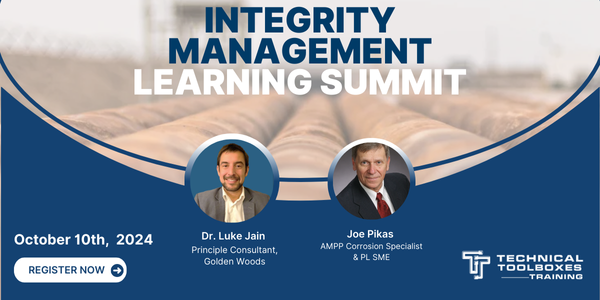September 20, 2023: Pipeline Failure Investigation and Root Cause Analysis
-
Author: Greg Morris and Kathy Buckingham
-
Level: Advanced
-
Study time: 6 hours
Write your awesome label here.
Course overview
What is the cause of pipeline failure? How do you investigate pipeline failure? What are pipeline incident investigations? What is root cause analysis for pipeline failures?
Unexpected events occur in all industries with designed and maintained assets. The pipeline industry is no different. These events, such as releases and ruptures, provide an opportunity to collect data and learn from the event such that future events can be mitigated. In addition, large events often result in interest from media, regulators, and external parties that may bring lawsuits against the operator and subcontractors responsible for constructing, operating, and maintaining the asset. The steps taken following an event are time-sensitive and critical.
The workshop will discuss the three primary phases in an investigation: On-site Examination, Metallurgical /Materials Failure Analysis, and Root Cause Analysis. The processes and applicable steps pertaining to each phase will be discussed, with case studies and discussion on what to do and what not to do to maintain the integrity of the investigation.
Unexpected events occur in all industries with designed and maintained assets. The pipeline industry is no different. These events, such as releases and ruptures, provide an opportunity to collect data and learn from the event such that future events can be mitigated. In addition, large events often result in interest from media, regulators, and external parties that may bring lawsuits against the operator and subcontractors responsible for constructing, operating, and maintaining the asset. The steps taken following an event are time-sensitive and critical.
The workshop will discuss the three primary phases in an investigation: On-site Examination, Metallurgical /Materials Failure Analysis, and Root Cause Analysis. The processes and applicable steps pertaining to each phase will be discussed, with case studies and discussion on what to do and what not to do to maintain the integrity of the investigation.
PDH Certificate included upon successful completion
-
Course Outline
- What Does An Incident Investigation Involve?
- Why Do We Perform Incident Investigations?
- Who Should Perform Each Step of an Incident Investigation?
On-Site Examination- What samples do I need to collect?
- How do I know if I found the failure origin?
- A fire occurred as a result of the failure. Does this impact my samples?
- Is there anything I should not do?
- Are there tests that need to be performed in the field?
- How should I handle/preserve samples?
- How should I label samples?
- How should I ship samples?
Metallurgical / Materials Failure Analysis- Steps of the Failure Analysis
- Visual Examination
- Chemical and Microbiological Analyses of Deposits
- Non-destructive Testing
- Fractography
- Metallography
- Mechanical Testing
- Testing of Metallic vs. Non-metallic Samples
Root Cause Analysis- Purpose
- Root Cause definition
- Evidence Capture
- Interviews
- Documentation
- Timeline Generation
- Hypothesis Development
- Select and Apply the Appropriate Methodology for the RCA
- Reporting and Recommendations
Greg Morris
Principal Engineer Incident Investigation, DNV
ABOUT Greg Morris
Mr. Morris is a Principal Engineer in the Incident Investigation section at DNV in Dublin, Ohio. He joined DNV in 2019 with 27 years of experience in the pipeline industry.
Prior to joining DNV, Greg Morris was employed by Kiefner & Associates where he was involved in integrity management support, failure investigation, risk assessment, material specifications, and training. Mr. Morris is an active member of API Subcommittee 5 that maintains API 5L and was a member of the Task Group of ASME Subcommittee F that developed the first edition of ASME B16.49 for induction bends. His training experience includes; Instructor, Pipeline Reliability Assessment Workshop, a two-day technical course presented to pipeline operators and Federal and State regulators, courses on defect assessment and repair, and a two-day course on the ASME B31.4 Safety Code.
Dr. Kathy Buckingham
Principal Engineer/Team Lead Incident Investigation, DNV
ABOUT Dr. Kathy Buckingham
Dr. Buckingham is a Principal Engineer / Team Lead in the Incident Investigation section at DNV and has over 18 years of experience in the pipeline industry. Her expertise is in root cause analysis, failure analysis, and internal/external corrosion.
She has conducted root cause analyses, over 100 failure analyses, and corrosion testing associated with the oil and gas, petrochemical, maritime, aeronautical, and biomedical industries. Prior to joining DNV, Kathy worked for a natural gas operator performing metallurgical analyses and emergency response support on pipelines, valves, compressor components, and storage well components, as well as analyzing internal corrosion coupons.

